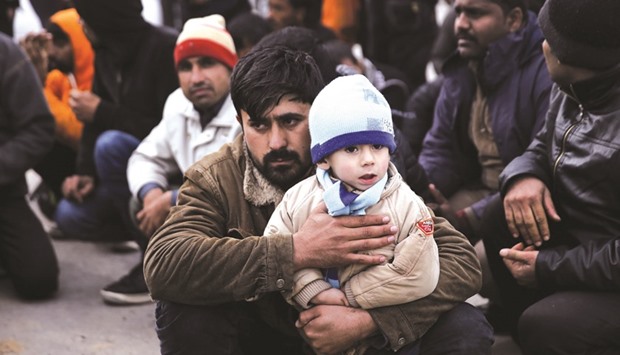The UN refugee agency has harshly criticised an EU-Turkey deal on curbing the influx of migrants to Greece, saying that reception centres had become “detention facilities”, and suspended some activities in the country.
“Under the new provisions, these sites have now become detention facilities”, the UNHCR said in a statement. “Accordingly, and in line with our policy on opposing mandatory detention, we have suspended some of our activities at all closed centres on the islands.”
The EU and Ankara struck a deal on Friday aiming to cut off the sea crossing from Turkey to the Greek islands that enabled 850,000 people to pour into Europe last year, many of them fleeing the brutal war in Syria.
The agreement, under which all migrants landing on the Greek islands face being sent back to Turkey, went into effect early on Sunday.
“The UNHCR is not a party to the EU-Turkey deal, nor will we be involved in returns or detention,” the agency said yesterday, adding though that it would “continue to assist the Greek authorities to develop an adequate reception capacity”.
It pointed out that Greece currently “does not have sufficient capacity on the islands for assessing asylum claims, nor the proper conditions to accommodate people decently and safely pending an examination of their cases”.
The UN agency said that 934 refugees and migrants had landed on Lesbos alone since the accord took effect.
“They are being held at a closed registration and temporary accommodation site in Moria on the east of the island,” it said, adding that the 880 others who arrived before Sunday were being hosted separately at the Kara Tepe centre, which is run by the local municipality and “remains an open facility”.
And just yesterday, 127 migrants were intercepted off the island of Lesbos, Greek officials there said.
“127 people, mostly Pakistanis but also around 10 Afghans, some Syrians and Congolese, were spotted by port police on board a boat off Lesbos and towed to the port of Mytilene” on the island, a port police official on Lesbos said.
One of the migrants recounted how they were first spotted by the Turkish coastguard who “tried to lead us back toward the Turkish coast but we had seen them so we picked up speed so we could be on the good side, the Greek side,” said Amrad, a 25-year-old Syrian who was driving the boat.
“Once in Greek waters, we were finally detained by the Greek coastguard,” he said.
Starting on Saturday, Greek authorities had begun accelerating the transfer to the mainland of some 8,000 refugees and migrants who had arrived on the islands before March 20, to separate them from those subject to return to Turkey.
The UNHCR said it had until now been supporting the so-called “hotspots” where migrants were received and registered on the Greek islands.
But it said it would not participate in closed centres.
“This includes provision of transport to and from these sites,” the agency said.
It stressed though that it would “maintain a presence to carry out protection monitoring to ensure that refugee and human rights standards are upheld, and to provide information on the rights and procedures to seek asylum”.
“UNHCR staff will also continue to be present at the shoreline and sea port to provide life-saving assistance,” it said.

An Afghan migrant holds his son as they wait to be transferred to the Moria registration centre after arriving at the port of Mytilene on the Greek island of Lesbos, following a rescue operation by the Greek Coast Guard at open sea.
